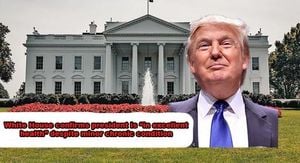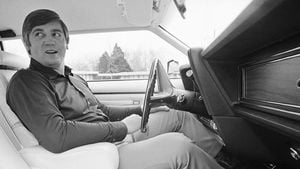Two decades ago, when the thought of endorsing gay marriage was almost unthinkable for many Democratic nominees, Kamala Harris was already making history. A newly elected district attorney at the time, she officiated one of the first same-sex unions in the United States during the momentous "Winter of Love" in San Francisco. That period, marked by Mayor Gavin Newsom’s controversial decision to allow these marriages without legal backing, paved the way for Harris to step forward when few political figures dared to take such risks.
“You could tell she was so overwhelmed and had so much joy about performing this ceremony,” recalled Brad Witherspoon, whose emotional marriage to Raymond Cobane was officiated by Harris on Valentine's Day 2004. This pivotal moment starkly contrasted with the hesitance shown by many of her political predecessors. Just four years later, the issue of same-sex marriage hadn’t entered the conversation during the Democratic primary, and it took until the following election for Barack Obama to endorse it.
For LGBTQ advocates, Harris’ actions were not mere political statements; her early support was pivotal. Chad Griffin, the former head of the Human Rights Campaign and now part of Harris' national fundraising committee, remarked, “Fewer [politicians] actually roll up their sleeves and use their power to make lives [better].” Harris was among the few brave enough to do so.
Reflecting on this historic role, Harris mentioned her decision to officiate those weddings was spontaneous. En route to the airport, she felt compelled to stop at City Hall. “There was all this wonderful excitement building as we welcomed the throngs of loving couples, one by one,” she wrote in her memoir, The Truths We Hold. Brad Witherspoon shared similar sentiments, emphasizing, “We were both crying and hugging each other” with Harris, who expressed her desire to be part of the moment.
Despite the initial euphoria, tragedy struck when those marriages were invalidated later the same year, which Harris described grimly as “devastated.” Yet, her connection to the LGBTQ community runs deep, influenced significantly by her upbringing. Growing up near San Francisco, she was surrounded by LGBTQ couples, recognizing their struggles and humanity long before they were openly acknowledged elsewhere.
Sean Meloy, from the Victory Fund aiming to boost LGBTQ political representation, highlighted the importance of Harris' background. “A lot of people didn’t know LGBTQ people,” he noted, reflecting on the societal climate during the Winter of Love, contrasted with the vibrant LGBTQ community of San Francisco.
Many of Harris’ political advisers were also part of the LGBTQ community. Jim Rivaldo, who had worked with Harvey Milk, California's first openly gay elected official, played a significant role as one of Harris' early mentors. After Rivaldo fell ill with AIDS, Harris’ mother provided him care, demonstrating Harris' familial kindness intertwined with her political activism.
Debbie Mesloh, Harris’ former communications director, stated she always focused attention on the legal issues impacting gay individuals. Harris even organized national symposiums to help prosecutors navigate what became known as the “gay panic” defense after gay hate crimes gained national attention. This defense, famously employed by the killers of Matthew Shepard, infuriated Harris and spurred her to act decisively against such discriminatory tactics.
Though supporting gay rights came with political risks, history has seen Harris willing to embrace those challenges. Governor Newsom learned this lesson firsthand when his support referred to the Winter of Love resulted in limited political capital. Yet, Harris’ commitment to officiate weddings wasn’t dwelled on political strategy; it sprang from genuine support and enthusiasm.
Witherspoon, who married Harris, noted the bravery inherent in her actions. “It is one thing to say I support gay marriage, but it’s another thing to put yourself on record and perform gay marriages, knowing at some point you want to move to a national level,” he said. Another sentiment from Cobane echoed similar respect, stating, “She had national ambitions, but she supported it ahead of the time and before anyone else.”
When it came time for Harris to run for California attorney general, the issue resurfaced as the state had just voted on Proposition 8, banning same-sex unions. Harris pledged not to defend the law, contrasting her stance with the death penalty, which she would uphold, much to the consternation of civil rights advocates who viewed this as inconsistent.
Despite accepting backlash, her refusal to defend Proposition 8 stood as part of her commitment to what she viewed as moral principles—something she demonstrated again when, following rumors about the legalization of same-sex marriages, she rushed to City Hall to officiate the marriage of plaintiffs Kris Perry and Sandy Stier. Griffin recalled the urgency of her response, “Say no more, I will meet you there.”
The evolution of the Democratic Party's stance on gay marriage culminated later when President Obama became the first sitting president to endorse such rights during his second campaign, prompted by Biden’s vocal support. Even Hillary Clinton came around years after Harris had already made her mark.
Today, same-sex marriage is not only part of the Democratic Party's ethos but also occasionally finds support from the Republican side. Still, many party members recognize Harris as a trailblazer who stood firm when certain stances were politically unpopular. Pennsylvania’s Democratic nominee Malcolm Kenyatta, who married his partner recently, remarked, “Whether [a position is] popular at the time or not, she does what is right.”
Harris' forged connections with the LGBTQ community serve as perennial reminders of how far conversations around love and equality have come, much thanks to her relentless advocacy. She’s not just part of the history; she’s been instrumental. Harris’ early stand offers steadfast support to the LGBTQ community she has authentically represented throughout her political career.



